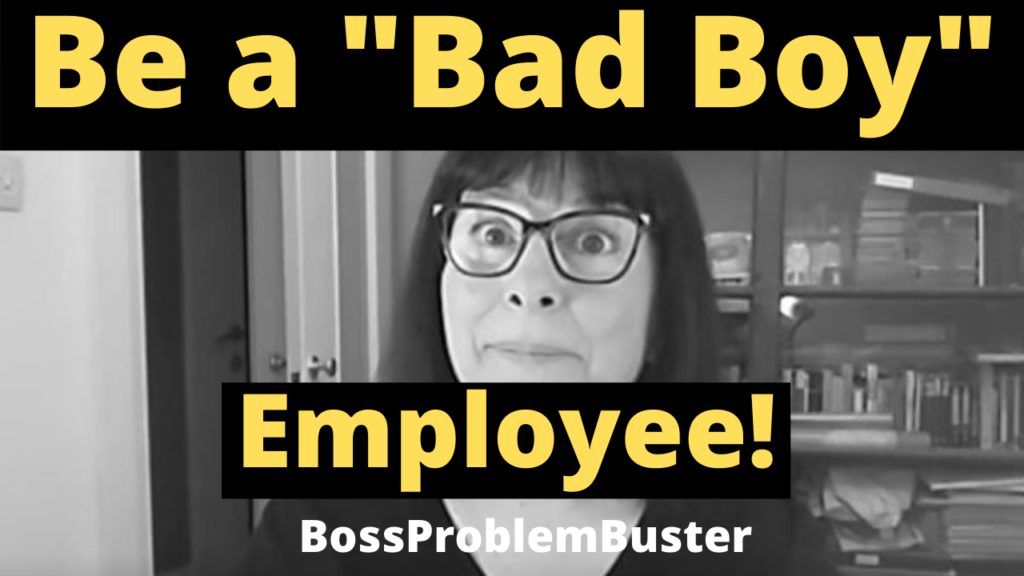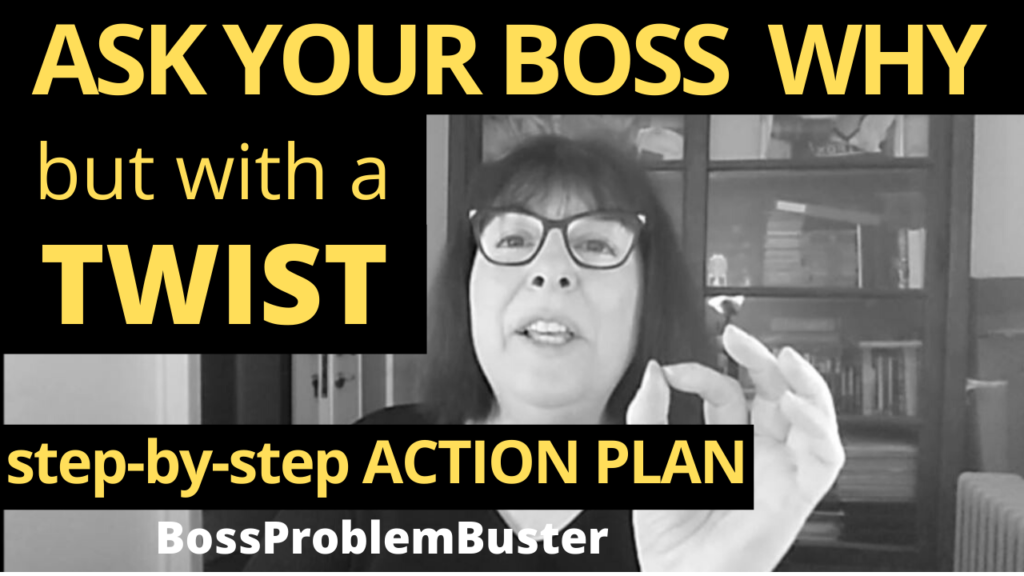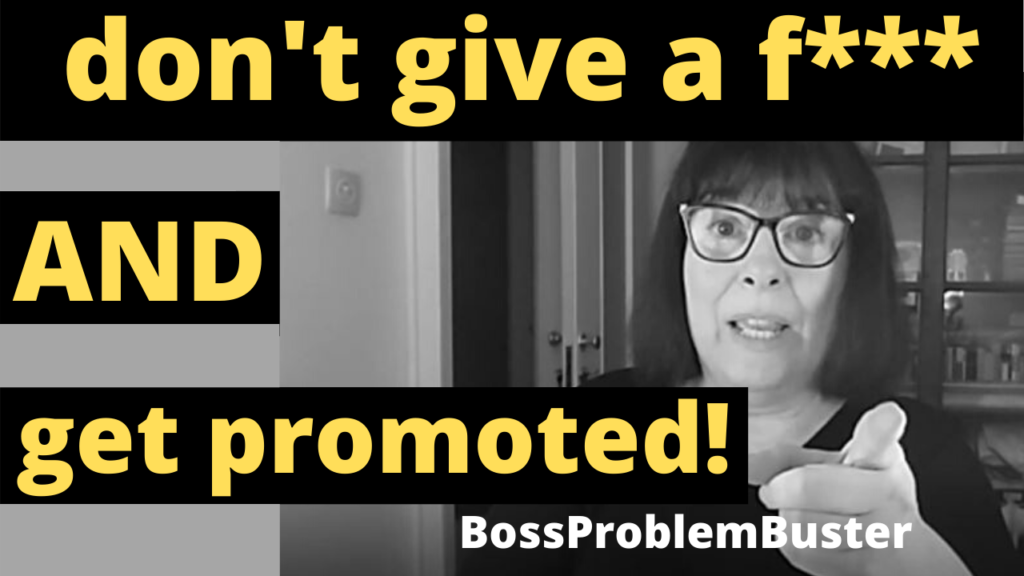part 4 of 6
Passed Over
For a Promotion
& Pay Raise:
What To Do
(and Not Do)
Right After
The Ultimate Guide

Your Emergency Snub Stack
let's bring YOUR inner joy back!
We’ll bust our asses for you
(some free some paid)
but you have to make the first move:
Put in your most frequently monitored email, NOW
and get us on you’re side!
(no, no freebie – you don’t need a bribe – you need results!)
part 4 of 6
Say You Want It!
And You Want It BAD!
Shape How Your Boss
Perceives Your Motivation
After Passing You Over
TLDR
(you’re welcome!)
Assert Yourself
to Your Boss and Colleagues Alike:
Say You Want It!
Out loud!
Then say it again, and Don’t Let Go!
If you don’t do it
somebody else will
and they will get it
and you will, once again,
be passed over –
you don’t want that!
watch / read to find out why
a crucial part of getting things is
verbalizing you want them!
(no "manifestation" B.S.)
Passed Over for Promotion & Pay Raise:
What To Do (and Not Do)
Right After
to Get Another Shot
The Ultimate Guide
Shape How Your Boss Perceives Your Motivation
After Passing You Over:
Say You Want It!
So, by now we’ve built our foundations, for what to do right after you have been passed over for a promotion, or a pay raise, or both, and we did it through DO no. 1 understanding your boss’ psychology, and how it can work to your advantage. Then we’ve built on that, to get the right mentality that would work to your advantage. We did this, through DOs no. 2 and 3: Be a “bad boy” employee, and Getting the “bad boy” employee mentality right. Thus, now it’s time now to move ahead to the final step, which is the implementation of all of the above. But you can’t implement before you have mastered those foundations, those first three DOs, so make sure you are well versed on them, before proceeding.
Okay let’s get going…
The no. 4 DO right after being passed over for a promotion or a pay raise or both is:
- Express Your Distress
Out of the rubble that is your current political position at the office, together with your crushed self-esteem, and a sprinkle of a sense of betrayal, for good measure – this may sounds too dramatic, but it’s not: it’s an accurate description of your emotional state, at this time, isn’t it? All of which are hallmarks of being passed over – so out of the rubble, you need to start paving a new road, that will take you all the way to the next opportunity, for a pay raise, or a promotion, or both.
However, since this is your emotional state, you might be doing what many others tend to do at such a state, and that is going into your shell, like a turtle or snail, and being more subdued, i.e. more of the “good boy” employee mentality and behavior.
Now, this is one of those steps where subtleties come into play again: Make sure you understand what it is and what it is not.
Express Your Distress does NOT mean being over emotional, crying, collapsing, acting depressed and miserable, being emotionally distraught, and all together touchy-feely.
It IS, however, easily admitting to anyone at the office, who asks or cares to listen: “Yes of course I’m upset, I’m extremely disappointed, and even deeply surprised and -yes- hurt”.
It’s okay if you walk around with a longer face than usual, just don’t be all gloom and doom, because then you’ll just repel people, plus you might project an air of emotional instability, which is obviously not what you want.
So the trick is admitting what you are truly feeling, without trying to hide it, and having the body language to match, but – and here comes the subtlety – without being too emotionally needy, or crossing the bounds of appropriate emotional expression, in the workplace.
This is true regarding your boss, your colleagues, and everybody you come in contact with, at the office. You’d be surprised, but this also includes clients and vendors: With them you should never INITIATE this conversation, but if it comes up because – especially with long time clients and vendors – they are very much involved – to some degree or another – with many people across your department, sometimes to a degree of real friendship that evolved over the years, so the Grapevine will get to them as well, and they may address it.
If they initiate it, do not shy away from it, do not freeze or feel awkward or uncomfortable – I’m preparing you now severe it won’t happen – instead, do the following:
a. Acknowledge it: “yes it’s true I was passed over”.
b. Then, admit your feelings, that are the normal human way anyone would feel under the same circumstances, so: “yes I’m very disappointed and upset”.
c. And here comes the most important part – it has to do with your professionalism – [and this you obviously do with your boss and colleagues as well] :
Stress that it does not have anything to do with your commitment to the project you’re working on together, and add “because I am a professional”.
d. Finish with a note of hope, that also shows resilience on your part: “I’m sure they’ll be other opportunities so I’ll just up my game even further” [note my very precise wording: it’s not that my game was down, and that’s why I was passed over, so now I’m going to up it, but that I’m going to up it EVEN further]
e. Smile and revert back to business talk, which will be your signal to them, of your boundary, regarding this personal short talk, so that it doesn’t drag and doesn’t make it (your failure) be the focus of your communication, with that other person.
So, once again, the full sequence is of 5 steps:
a-Acknowledge being passed over
b-Admitting you’re upset
c-Assert your professionalism bye reassuring your performance and relationships at the office will not suffer because of your personal setback
d-Express hope for the future to show your resilience
e-Keep your boundaries (if you’re devastated don’t show them that – you don’t want them to think you’re unstable), and pivots back to the business at hand,which is yet another manifestation of your professionalism: you don’t dwell on, or wallow in, your own emotions, but you’re plowing ahead onwards and upwards!
So it’s just a quick in-and-out, and boom! You nailed it!
Why is this DO, Express Your Distress, so crucial?
What is the psychology and practicality behind it?
There are 4 reasons why Express Your Distress is so crucial. They are intertwined, and yet it is important to understand each, in and of itself:
- Not showing emotions, especially when they are humanly called for, will not the only not endear you to people, but also will make you look like a freak,
plus, this might disqualify you from a promotion, because managing people requires emotional sophistication and subtleties (as neither you nor your potential subordinates are robots), so showing the corresponding emotion
to the situation at hand, in your case – the heartbreak of being passed over – is crucial, with, of course, the caveat I’ve already addressed, that it shouldn’t be excessively emotional, or not appropriately emotional – we don’t want to overdo it – hence my constant emphasis on sophistication and subtlety.
Remember we’ve said you not Larry David? Well you’re not Mr. Spock either
(sorry to step all over your artistic pretensions), but seriously, it is because you are not Mr. Spock, that expressing no emotion whatsoever, especially when it is absolutely called for and reasonable, makes you a Vulcan, but unlike Mr. Spock, no one is going to revere you for that.
- When one does not express an emotion that is correspondent to the situation at hand, people might be confused as to what this person is truly about, and they may get suspicious, because anything that is confusing to people, i.e. anything that doesn’t follow common social scripts, seems awkward, and therefore creates discomfort, which might lead to suspicion regarding that person. You don’t want to be on the other end of that suspicion.
- When you’re very subdued and Mr. Spock-y (instead of upset), it is confusing to people in yet another way: They don’t know how to behave around you. They take their cues from you on whether to address the issue of you being passed over or not, whether to console you or not, whether to approach you, or avoid you and, so forth.
You don’t want to be in this position either – it’s not conducive to, what I call, your “office politics ranking” (not to say “rating”), and surely you see how this bad ranking, or rating, is not conducive for a promotion, or pay raise, or both.
By the way, the good news is that most people, once you’ve expressed
your distress to them, will be empathetic (unless they dislike you which will make them gloat, but the only behind your back), so most people will be empathetic and will even be extra considerate for a short period of time after the matter – so you may even gain some “slack cutting” from everybody around you – not your goal, of course, but not too shabby. And since you’re emotionally beaten, any slack cut your way and any goodwill would naturally be appreciated, won’t it?
- Reason no. 4 why Express Your Distress is so crucial is the MOST crucial of them all: If passing you over for a promotion, or a pay raise, or both, doesn’t evoke any emotion in you, any overt reaction, any disappointment, know that your boss might be inclined to deuce, that’s it wasn’t that important to you, that it wasn’t that big of a deal to you, and therefore he might be reinforced in his decision to pass you over this time around, and worse – he may take you out of the game completely for next time, because if it doesn’t impact you, you probably don’t want it as badly as the other guy or gal, and he would much rather give it to them: somebody who really wants it badly! Because the assumption is that, THE DEGREE OF WANTING, IS A MARKER THE DEGREE OF MOTIVATION.
See how being a “good boy” employee, and being very subdued in your reaction, harms you? Because it absolutely can, and hopefully I have proven it to you, by now.
To sum this up, you must understand that, you expressing your distress, as this DO no. 4 suggests, is not about you so much, in an odd kind of way, (because I am telling you to show your disappointment), but it is about how people PERCEIVE you – your boss most of all!
So, regardless of what you feel comfortable doing, regardless of what you actually feel, (say you not devastated perhaps, for whatever reason), you need to be very conscious, about the degree of emotion that you need to express, in order for you to be in the game, the next time round. Bet nobody ever told you that, right? That’s why you’re here, on this website!
Once you’ve done all the above, you have perfected the psychological, and political, and behavioral basis, to go on to the next step. Indeed, the next step is derived directly from this one, and would be impossible without it. Thus, they are to be implemented concurrently.
So, the no. 5 DO (what TO DO), right after being passed over for a promotion, or a pay raise, or both, is:
- Assert yourself – to your boss and colleagues alike!
Why? Because an overlooked crucial part of getting things is, VERBALIZING YOU WANT THEM: first to yourself, then to others.
Let me stress, this is not some “manifestation” b**s*** of some “Secret” con! There is no secret here in THAT regard! I can’t stress this enough! There is just my thoughtful observation, of 24 years as a successful organizational consultant, mixed knowing how bosses operate (derived from this professional experience, together with past experiences as an employee), and topped with understanding human psychology (I’m a social psychologist). And now, I’m giving you all the behind-the-scenes secrets. Remember, you’re Dorothy, and I’m your little doggie Toto, pulling back the curtain, exposing the real Wizard of Oz, that is your boss…
Oh wait, with the “Secret”, it wasn’t verbalizing what you want, but posting on a vision board, and then… just letting the universe come to you…
By the way, no harm in doing a vision board, as long as you ACT on it: Make a plan, acquire the relevant skills and e-x-e-c-u-t-e whatever it is that will get you what’s on the board, which is the part they forgot to mention, so you have a generation of vision board-ers, sitting on their ass, passively, waiting for things to happen, which is the QUINTESSENTIAL OPPOSITE of what I’m saying – so much so I even coined a term for it: The Sleeping Beauty syndrome, but don’t get me started on that…
Just know that when and if I use the word “secret”, it’s only in its dictionary literal meaning: Something people don’t know. And in this case: Something most career coaches, consultants, and their ilk, don’t know either, nor understand, nor ever talk about –
An incompetent that drives me crazy, which is why I am compelled do what I do, and say what I say.
Okay, enough of that.
So back to the no. 5 DO (what TO DO) which is: Assert yourself – to your boss and colleagues alike, and the crucial part of getting things, which is verbalizing you want them.
Now, the fact that you say you want something, obviously does not mean you’re going to get it. The point is: If nobody knows that you want the [blank] – whatever it is – and it is in their power to grant it to you or not to grant it (so you are dependent on them), then, if you don’t verbalize it, you’re stacking up the odds against yourself, because if they don’t know, how can they even consider you for the “thing”?
This is true for anything you desire, where you are dependent on others in getting it, so it goes way beyond the realm of work alone.
By the way, here’s a fun fact: Alfred Hitchcock, the acclaimed director, called it a “MacGuffin” – the thing that the hero is after, whatever it is that motivates him to go on his hero’s journey (or hers). Since you are the hero in this story, your MacGuffin is that promotion and or pay raise.
Although, fun fact: turns out, that despite being credited for coining this well-known term in the movie business, for decades now, and dubiously never correcting anyone on the matter when interviewing on it (the Dick Cavett Show, for example) – the coiner of the “MacGuffin” was not Hitchcock, but a British screenwriter by the name of Angus McPhail, who worked with Hitchcock, which is where he picked it up.
So… there you go, some semi-old-Hollywood trivia, that is pertinent to our discussion, and that you may nonchalantly pull out of your sleeve, at some cocktail party.
Okay, enough of that – back to the salt mines…
The point is, if nobody knows what you want, what you’re after, what your MacGuffin is, trusting that people would somehow be able to look into your heart and know your desires – this is impractical. It is not based in reality.
People rarely get what they want in this Sleeping Beauty kind of way, where you are completely passive about it… even a lottery ticket… you still have to go out there, and buy one! So be active in all the ways I’m laying before you!
Now, even if people KNOW what your MacGuffin is – your boss first and foremost – or at the very least, they SUPPOSES that you want that MacGuffin (in our case: the promotion and pay raise), as long as you don’t articulate it to them, then, for all intents and purposes, especially in the eyes of your boss, you are then the “good boy” employee, the one who will quietly accept any outcome, being passed over included.
Therefore, your boss would rather give the promotion, or pay raise, to the “bad boy” employee who keeps yapping about it all day long, in a full-on attrition warfare, and would give said boss hell, if he (or she) doesn’t get THEIR MacGuffin, which, unfortunately for you, happens to be the same as yours!
See how it all comes together with everything we’ve spoken about, regarding your boss’ psychology?
So to sum up, we’ve seen 3 reasons for the “assert yourself to your boss and colleagues alike” which is the no. 5 DO (what TO DO) right after being passed over for a promotion, or a pay raise, or both:
- technical, pragmatic reason, which is: If you don’t tell them – they don’t know.
- a political reason, which is: If you don’t tell them they can pretend not to know, or they may assume you want it, but also assume you don’t want it as bad as the next guy or gal, who keep yapping about, it all day long.
- the psychological one: “Good boys” finish last.
This one deserves some iteration, so for that, let’s go back to the parents and children analogy, we have used before.
You know how parents say “no”, until the child exhausts them, with a constant barrage of unbelievable nagging, until they finally say yes? This is similar to what a “bad boy” [employee] does and a “good boy” [employee] doesn’t.
You already know you have to have a “bad boy” employee mentality, so let THAT be your workplace north star.
Now let me add one last reason for “assert yourself”, no. 4. So, after the technical, the political, and the psychological, no. 4 is: Motivational.
- Once you state openly, overtly, and constantly: “I want that”, “this is what I’m after”, “this is what I’m here for”, AND you add: “I’m willing do whatever it takes to get there” – not in a psychopathic way, of stepping all over people, or stabbing them at the back, but in a productive way, that signals and proves your sheer motivation – “I’m willing to put in the extra work, I’m willing to bust my ass for this company, just tell me what to do and I’ll do it, even at the expense of my personal life, comfort, energy, whatever it takes!”
No boss can stand in the way of such commitment and motivation!
No one.
Now, I’m NOT telling you, you must sacrifice your personal life. It is your choice whether to do it, and if so – to what degree. What I AM telling you is how it looks from the other side. I’m giving you a peek behind the curtain, to your boss’s perspective.
Armed with this understanding – make your own choices.
Get notified
so that you can bring YOUR
inner joy back!
when a new video / post is uploaded
(not too often, just right)
you’ll get the link delivered to your email
so that you don’t miss on the insights and tools
that can kill your Monday blues once and for all!
So if you’re serious about getting YOUR inner joy back –
Put in your most frequently monitored email, now:






